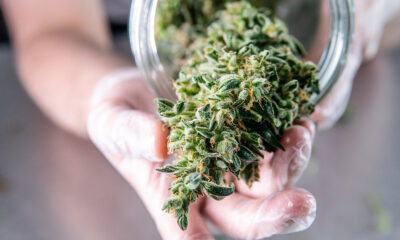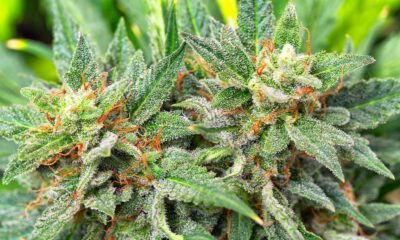
Joint Opinions
Reefer Rehab: Getting Off the Pot Won’t Hurt Too Bad
Withdrawing from cannabis use results in mild physical symptoms for most people.
Let’s just say, for the sake of argument, that the dreaded marijuana monkey is nibbling on your back. Marijuana has latched onto your eternal soul with cruel intentions and the situation has since elevated to the point where this savage, unholy beast won’t even let you smoke the last nugget of Blue Dream that you have in your possession until payday without filling your head full of ridiculous thoughts, like “I wonder how much the pawn shop would give me for that television?”
If this is happening, the reefer has done went and put you sideways, son. If you’re not careful this addiction to marijuana — because let’s face it, that’s what this is, an addiction — might be on the verge of graduating to the next level and then you might be doomed to live out the rest of your days in stoned servitude.
Okay, let’s get this out on the table right now. The above scenario, while humorous and worthy of ridicule, is not likely to happen to even the most enthusiastic breed of cannabis enthusiast. Some lawmakers, religious nuts and other conservative loudmouths might argue that marijuana is an addictive substance. After all, it is a Schedule I dangerous drug in the eyes of the federal government, which means it is in the same classification as heroin. Stand on the corner of Anytown, USA and you can hear the hags-against-highs preaching about the state of the nation under the wrath of cannabis.
Good lord, Martha, can you believe that they are actually making wacky tobacky legal in parts of the country? The entire nation is going to hell in a hand basket, I tell you. Not even Trump can save us!
The truth of the matter is marijuana is only considered about as addictive as caffeine. Some of the latest data from the toolboxes in Washington show that roughly only around 9 percent of those who try marijuana will end up with a problem.
Depending on whom you ask, this so-called “marijuana dependency” doesn’t even really count as an addiction. It’s not like the kind of strong-arm habit that comes from doing drugs like cocaine, heroin and meth. The desire for more of these mind-altering substances has the potential to create some rather desperate situations when the supply gets depleted. Sadly, pawning one’s worldly possessions is at the lower end of the scale.
But marijuana is mild, and we’ve never heard of anyone pawning his or her TV for a bag of grass. Still, marijuana addiction has entered a new level of discussion over the past several months. Now that more states are legalizing for recreational use, the naysayers of nugs are convinced that more people are destined to end up in the grips of cannabis addiction. And if this happens, it is just a matter of time before these soulless ingrates trade in their bongs, one hitters and dab rigs for a gram of smack and a bag of syringes.
But this theory is what Kramer from the sitcom Seinfeld would call “kooky-talk.” Even the federal government admits that cannabis doesn’t have the power to open the gateway to hard drugs. The National Institute on Drug Abuse (NIDA) says, “alcohol and nicotine” are “more likely to inspire people to use harder substances.” And come on, the United States is presently lingering in one of the worst opioid epidemics to ever sweep the land.
How much worse can it really get?
Still, addiction is the disease of the week. And rest assured, there is some poor schlub out there right now convinced that he has been mauled by the marijuana monkey. His parents have told him that he’s addicted to weed, the therapist he was sent to after they discovered a joint in his sock drawer is telling him he’s addicted, so he has no choice but to get clean in order to remain in good standings with the family. Or at least avoid getting shipped off to military school.
So what withdrawal symptoms are coming to this poor kid while he rehabs from the reefer?
Interestingly, it wasn’t until around five years ago when the American Psychiatric Association determined there should be something called marijuana withdrawal syndrome. The 2013 version of the DMS-5 was the first to detail seven symptoms that might rear their ugly heads if a longtime cannabis user was to try and quit cold turkey. “Irritability, weight loss, insomnia, restlessness, anxiety, depression, and physical symptoms (chills, stomach pain),” were the only symptoms to make the cut out the 40 that were proposed. But these ill effects are not common in most regular users.
It should also be noted that cannabis withdrawal, if there really is such a thing, is “much less severe than those associated with withdrawal from chronic opioid or depressant use,” according to NIDA.
So even if a person considers his or herself the most hardcore cannabis addict on the planet, getting over the hump of not being high is something that should straighten out within a week to 10 days. There are plenty of rehab facilities that will be more than happy to take your money, but going broke to stop smoking weed really isn’t necessary. There is also Marijuana Anonymous for those would have more success in a 12-step program.
TELL US, have you ever felt like you were experiencing cannabis withdrawal?


























